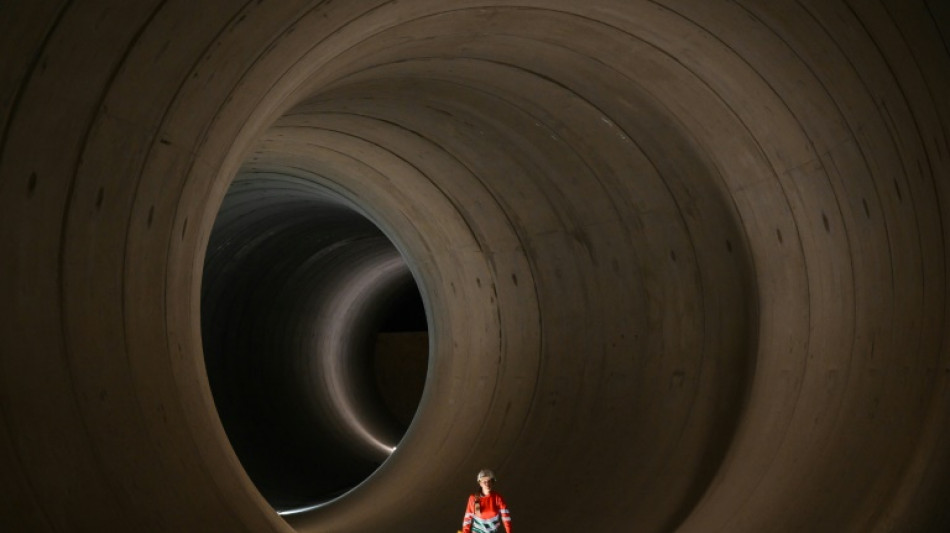
-
 UK royal finances in spotlight after Andrew's downfall
UK royal finances in spotlight after Andrew's downfall
-
Diplomatic shift and elections see Armenia battle Russian disinformation

-
 Undercover probe finds Australian pubs short-pouring beer
Undercover probe finds Australian pubs short-pouring beer
-
Epstein fallout triggers resignations, probes

-
 The banking fraud scandal rattling Brazil's elite
The banking fraud scandal rattling Brazil's elite
-
Party or politics? All eyes on Bad Bunny at Super Bowl

-
 Man City confront Anfield hoodoo as Arsenal eye Premier League crown
Man City confront Anfield hoodoo as Arsenal eye Premier League crown
-
Patriots seek Super Bowl history in Seahawks showdown

-
 Gotterup leads Phoenix Open as Scheffler struggles
Gotterup leads Phoenix Open as Scheffler struggles
-
In show of support, Canada, France open consulates in Greenland

-
 'Save the Post': Hundreds protest cuts at famed US newspaper
'Save the Post': Hundreds protest cuts at famed US newspaper
-
New Zealand deputy PM defends claims colonisation good for Maori

-
 Amazon shares plunge as AI costs climb
Amazon shares plunge as AI costs climb
-
Galthie lauds France's remarkable attacking display against Ireland

-
 Argentina govt launches account to debunk 'lies' about Milei
Argentina govt launches account to debunk 'lies' about Milei
-
Australia drug kingpin walks free after police informant scandal

-
 Dupont wants more after France sparkle and then wobble against Ireland
Dupont wants more after France sparkle and then wobble against Ireland
-
Cuba says willing to talk to US, 'without pressure'

-
 NFL names 49ers to face Rams in Aussie regular-season debut
NFL names 49ers to face Rams in Aussie regular-season debut
-
Bielle-Biarrey sparkles as rampant France beat Ireland in Six Nations

-
 Flame arrives in Milan for Winter Olympics ceremony
Flame arrives in Milan for Winter Olympics ceremony
-
Olympic big air champion Su survives scare

-
 89 kidnapped Nigerian Christians released
89 kidnapped Nigerian Christians released
-
Cuba willing to talk to US, 'without pressure'

-
 Famine spreading in Sudan's Darfur, UN-backed experts warn
Famine spreading in Sudan's Darfur, UN-backed experts warn
-
2026 Winter Olympics flame arrives in Milan

-
 Congo-Brazzaville's veteran president declares re-election run
Congo-Brazzaville's veteran president declares re-election run
-
Olympic snowboard star Chloe Kim proud to represent 'diverse' USA

-
 Iran filmmaker Panahi fears Iranians' interests will be 'sacrificed' in US talks
Iran filmmaker Panahi fears Iranians' interests will be 'sacrificed' in US talks
-
Leicester at risk of relegation after six-point deduction

-
 Deadly storm sparks floods in Spain, raises calls to postpone Portugal vote
Deadly storm sparks floods in Spain, raises calls to postpone Portugal vote
-
Trump urges new nuclear treaty after Russia agreement ends

-
 'Burned in their houses': Nigerians recount horror of massacre
'Burned in their houses': Nigerians recount horror of massacre
-
Carney scraps Canada EV sales mandate, affirms auto sector's future is electric

-
 Emotional reunions, dashed hopes as Ukraine soldiers released
Emotional reunions, dashed hopes as Ukraine soldiers released
-
Bad Bunny promises to bring Puerto Rican culture to Super Bowl

-
 Venezuela amnesty bill excludes gross rights abuses under Chavez, Maduro
Venezuela amnesty bill excludes gross rights abuses under Chavez, Maduro
-
Lower pollution during Covid boosted methane: study

-
 Doping chiefs vow to look into Olympic ski jumping 'penis injection' claims
Doping chiefs vow to look into Olympic ski jumping 'penis injection' claims
-
England's Feyi-Waboso in injury scare ahead of Six Nations opener

-
 EU defends Spain after Telegram founder criticism
EU defends Spain after Telegram founder criticism
-
Novo Nordisk vows legal action to protect Wegovy pill

-
 Swiss rivalry is fun -- until Games start, says Odermatt
Swiss rivalry is fun -- until Games start, says Odermatt
-
Canadian snowboarder McMorris eyes slopestyle after crash at Olympics

-
 Deadly storm sparks floods in Spain, disrupts Portugal vote
Deadly storm sparks floods in Spain, disrupts Portugal vote
-
Ukrainian flag bearer proud to show his country is still standing

-
 Carney scraps Canada EV sales mandate
Carney scraps Canada EV sales mandate
-
Morocco says evacuated 140,000 people due to severe weather

-
 Spurs boss Frank says Romero outburst 'dealt with internally'
Spurs boss Frank says Romero outburst 'dealt with internally'
-
Giannis suitors make deals as NBA trade deadline nears


London's new 'super sewer' to end Thames pollution blight
The door of the steel box lift clanks shut and a crane slowly lowers construction workers building London's "super sewer" 40 metres (130 feet) to the bottom of an enormous vertical shaft.
Here, a world away from the city's busy streets, thousands of engineers and construction staff have spent the past seven years creating the biggest-ever upgrade to the city's 19th-century sewers.
London's existing sewerage network dates back to the second half of the 1800s when it was designed by civil engineer Joseph Bazalgette in response to the infamous "Great Stink".
In July and August 1858, a combination of soaring temperatures and a sewerage system that emptied straight into the Thames resulted in the city being engulfed in a cloud of putrid air.
The unbearable stench led to the construction of the sewerage system that is still in use today.
But in recent decades, lack of capacity due to the British capital's population growth has meant that raw sewage has once again flowed into the river.
Although an engineering wonder of the 19th century, Bazalgette's network used the same pipes to transport both sewage and rainwater, resulting in effluent often spilling into the Thames due to lack of capacity.
- Growing population -
"Any time it rains, even a light drizzle, the sewers fill up and pour directly into the river," said Taylor Geall of the construction firm Tideway, which is behind the project.
"At the moment, in an average year 40 million tonnes of sewage spills into the Thames completely untreated," he said
Although the old brick-lined sewers -- built between 1859 and 1875 -- are still in "pristine condition" they are just not big enough.
"The issue is capacity," Geall added.
The network was constructed when London's population stood at just four million compared to about nine million today.
With the size of the population set to continue to swell, the need for the £4.3-billion ($5.6-billion) upgrade has become critical.
The new 25-kilometre (15-mile) "super sewer", which is 7.2 metres in diameter, snakes from west to east following the curves of the river.
When operational, it will carry sewage only when rain means the existing sewers are full to overflowing.
Overflow points will allow the sewage that would otherwise have flowed into the Thames to be diverted into the new tunnel.
At its height, 10,000 people were working on the project, which has seen six tunnel-boring machines forge through three distinct geologies -- clay in the west of the city, sand and gravel in the centre and chalk in the east.
- Sewage spills -
The final stages of the mega project, however, come amid controversy for the privatised water sector which stands accused of chronic underinvestment in their networks.
The latest figures released by the government-sponsored Environment Agency show an average of 825 sewage spills a day last year into UK rivers and coastal areas.
A number of beaches on the Isle of Wight off England's southern coast had to be closed during last year's summer heatwave due to the high proportion of bacteria from water pollution.
Surfers Against Sewage, a pressure group, recently published a list of 83 beaches to avoid in Britain due to the discharge of raw sewage.
The government this week confirmed that water companies, as well as others such as energy and waste operators, will face unlimited fines for polluting practices.
The head of Thames Water, whose customers are funding the tunnel through a levy on their bills, stepped down in late June amid a furore over the company's £14 billion debt.
With the tunnelling phase of the "super sewer" completed last year, it is on track to be trialled in 2024 and fully operational by 2025.
"What we're doing is intercepting and taking away 95 percent of the spills," Geall said.
"So once we're finished the river won't look much different -- it's always going to be quite a silty river -- but it will be a much healthier environment for the fish, the marine mammals and the birds that live in it as well as for the rowing communities that use it."
Mathew Frith of the London Wildlife Trust agreed that the new sewer would make a "major contribution" to the River Thames' recovery, but warned it would not solve the problem elsewhere.
"Some (water companies) are taking their responsibilities quite innovatively. But whether there's that level of investment that we've got in London, I'm not sure that's the case yet," he said.
M.AlAhmad--SF-PST




